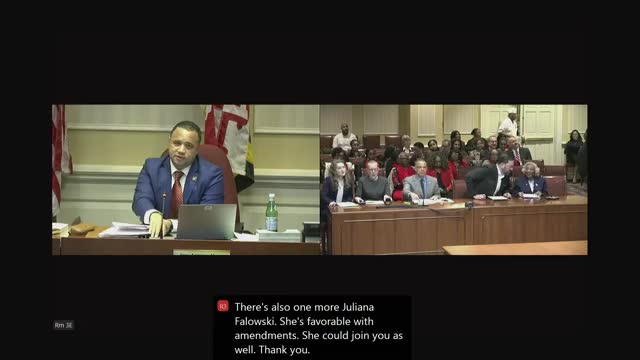Bill would codify forensic review boards and create community forensic aftercare program; families and advocates seek transparency
Get AI-powered insights, summaries, and transcripts
Subscribe
Summary
Senate Bill 43 would codify facility-level forensic review boards and create a Community Forensic Aftercare Program to monitor conditional releases; families and defense attorneys urged standardized reporting and clearer rationale in board findings.
Senate Bill 43 would codify Maryland’s forensic review boards (FRBs) and establish a Community Forensic Aftercare Program (CFAP) within the Department of Health to monitor and support individuals conditionally released from state psychiatric commitment.
Sponsor Sen. Malcolm Augustine said the measure seeks to standardize board structure and reporting across facilities that house persons committed by courts, improve transparency and provide guardrails to help courts evaluate clinical recommendations. “The boards are responsible for reviewing and determining whether to recommend to the court that a committed person is eligible for discharge or conditional release,” Augustine said.
Family members, clinical advocates and public defenders described long-standing gaps in transparency and inconsistent documentation of FRB decisions. Shelley Stokes, a mother of a person who has been committed, said she did not learn about FRB meetings or reports for six years and later found FRB reports contained incomplete or inaccurate findings. “We were unaware that there were FRB reports with findings, conclusions, and recommendations,” Stokes said. Attorneys for the Office of the Public Defender and NAMI Maryland urged the committee to require FRBs to document decisions and briefly explain the rationale and recommendations so clinicians, families and courts can work toward release‑ready treatment plans.
Department of Health Secretary Laura Herrera Scott filed a written letter of concern and testified that while MDH supports standardizing FRBs, the CFAP is currently at capacity. She said implementing CFAP requirements as drafted would create a significant fiscal note because the department’s current monitoring staff could not absorb the additional workload and community capacity for receiving discharged patients is limited.
Ending: Sponsor and stakeholders indicated they will continue working on amendments to refine the CFAP requirements and data/reporting standards so the department’s capacity and fiscal effects can be addressed.
